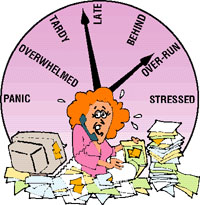| Cutting Edge Ideas from 2500 Years Ago |
|
|||||||||||||||||
Time Management? Give Me A Break!! 
This is the best season of your life." — Wu-Men It's May and we're busy building momentum, humping hard against that time soon to come when the beaches beckon and our voicemail messages get as much attention as a Wi-Fi hotspot in Caribou, Maine. Meanwhile, thanks to the market realities that have caused support staff to shrink even as revenue growth imperatives continue to increase, we find, sadly, that we absolutely must do more with less.
But how, in this relentless atmosphere, do we
manage our time? How do we make sure, as the
months march by, that we get everything done?
There is no such thing as time management — there is only how we choose to process our lives. As my Dad once said in the 70's, when presented with an unexpectedly high bill for a car repair: "I can either get completely aggravated and pay the money, or just send in the check and forget about it — either way, I'm paying the money." Look back over your careers and I think you will see that what really needed to get done at any given moment got done. The rest either got done later or never really needed doing in the first place. How you felt as the process was taking place, however, directly correlated to how effective you were. Being productive is a matter of paying attention. If you are aware of what your mind is focusing on moment by moment and learn how to gently bring it back to the task at hand, you cannot help but increase your output. So — time management? Fuhgeddaboudit! But there are some steps you can take to be more productive and spend less time feeling stressed about your workload. The first is — relax! Counterintuitive, no? But it works. For the past fifteen years, I've been using a visualization designed specifically for a busy work day that always seems to do the trick. Just hit the reply button and shoot me a quick email and I'll be happy to send you a copy.
Remember, you're not getting anywhere — you're already there. It's your choice how you live those precious moments. Relax, practice controlling where you will or will not place your attention, and develop an appreciation for the rich, complicated, funny and sometimes unpleasant exercise we call an average work day, and I promise you will get more work done without resorting to one of those artificial "time management" systems (you can throw away those bright magic markers and multi-colored folders they gave you at that last seminar). Life is neither a race nor a treadmill but, as both the Buddha and Broadway lyricist Dorothy Fields wisely knew, a seesaw. Here's how Fields sums it up in her song from the Broadway show of the same name:
As your life goes by, you're either low or high, So what if you never get anywhere, It's still been one hell of a ride." See you at the playground! To listen to a clip from Seesaw by jazz great Mark Murphy, click here
|
|||||||||||||||||
|
email: jim@jimschaffer.com voice: 617-529-4001 web: http://www.jimschaffer.com |
|||||||||||||||||